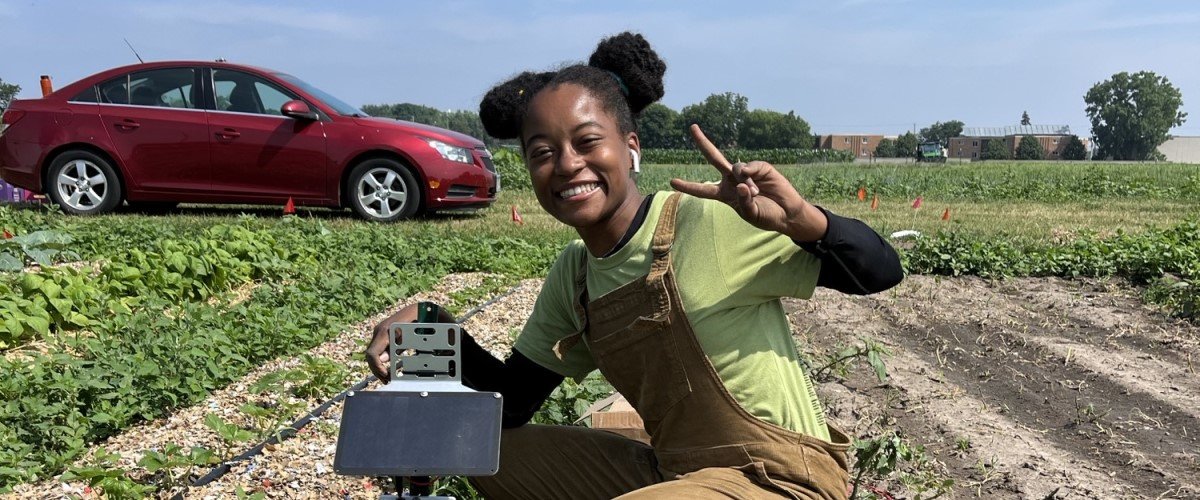
Making the most of summer

Jakeisha Lewis is a junior studying Agriculture and Natural Resources at Berea College in Kentucky. She conducted research in ground-based sensors in the GEMS Informatics Lab at the U of M last summer as part of the SOAR-REEU program, which creates research experiences for undergraduate students passionate about sustainable agriculture and food systems. She hopes to return to the U of M for graduate school.
Finding a passion in agriculture
I started in agriculture when I got to Berea College! One special thing about my college: It was the first interracial and coeducational college in the South. And it doesn’t charge tuition!
I took an environmental science course in high school, and the class and professor inspired me to pursue something outside and environmentally oriented. When I was a freshman, Berea did not offer an environmental science major, so I chose agriculture and natural resources. I am glad I switched because I found my true passion in agriculture, specifically plant breeding and genetics!
On challenging stereotypes
I experienced a lot of mistreatment for wanting to pursue agriculture because it was perceived by some as “setting myself back in history.” I even received comments like, “Your ancestors were forced to work in the field. Why would you want to go back?”
To be honest, I considered their points and wondered what going into agriculture as a Black woman meant for me. I came up with the answer that it meant change. Changing the stereotypes of who should be gardening or farming. Increasing the percentage of not only women in the field but also people of color. Growing food does not have a race; it is for everyone.
Seizing an opportunity with CFANS
I chose the SOAR-REEU program because of the amazing opportunities I had a chance to grab. Being part of a lab specific to my interests and having my own mentor was just a blessing to hear about! The support from my professor Dr. Mary Parr at Berea College and Dr. Julie Grossman at U of M really encouraged me to apply and accept the offer.
Many other summer programs require the student to find their own housing, meal plans, finances, etc. A lot of this can be a block in participating in an otherwise exceptional program. However, the U of M made it possible for these things to be the least of my worries, and for that, I am grateful.
Mentorship in Minnesota
My summer research PI, Bryan Runck, PhD, played a huge role in encouraging me to do my best. He gave me a large genre of what I could choose as my summer research, which was exciting! I felt like I always had a supportive team by my side. Bryan set big goals and high expectations for me because he wanted me to be able to do something with my research and take it further than the poster session.
A memorable summer
I have so many memories from SOAR-REEU it is difficult to choose one! One of my favorite lab memories was going out to collect data using a penetrometer—a device that reads pressure for soil compaction. It was my first time collecting data and setting up my own experiment. I was so excited when I saw what I had created on paper—with the help of mentors and PI—being successfully executed in the field.
A supportive environment
My faith has played the most important role in where I am today. Knowing that God has a plan for me to prosper and not fail (Jeremiah 29:11) gives me encouragement to keep pushing forward in this life. I have been blessed with a community that wants me to succeed and family/friends who love me. My parents and my identical twin sister always push me to be the best I can be while letting me know they are proud of me.
On what’s next
My next steps are to continue walking in the plan God has for me. After graduating, I plan to go to Africa with the Peace Corps and work in rural agriculture. After I complete the program, I plan to go to grad school at the University of Minnesota or the University of Hawaii.
In Advancing Agriculture, members of CFANS’ Black community share their pathways in agriculture. From student researchers to faculty members and alumni, their contributions have an impact here in Minnesota and around the world.









